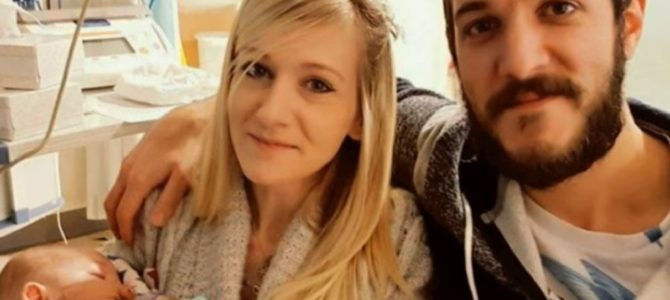
The ugliest political battle currently underway in Western society is not between Donald Trump and Mika Brzezinski or the United Kingdom and the European Union but between two parents with a dying baby and the British courts. The baby, Charlie Gard, has been terminally ill since his birth, unable to move his limbs or breathe on his own.
His parents wish to bring him to the United States for a long-shot experimental treatment. The courts object, believing Charlie should be allowed to die “with dignity.” The European Court of Human Rights declined to hear an appeal, effectively sealing the boy’s fate.
Against the backdrop of this barbaric abuse of judicial authority, the Catholic Church—the world’s greatest defender of the right to life, and long a moral bulwark against state intrusion into the rights of the family sphere—has decided that the courts in this case are basically right.
These are difficult times for orthodox Catholics, beset by a pope who often appears inclined to dismiss centuries of church teaching and a fair number of bishops who are apparently determined to follow him. Catechetical esoterica regarding Eucharistic doctrine, of course, can seem hopelessly complex for even the lay Catholic these days.
But the Catholic Church’s position on the sanctity of life is unmistakable to anyone, and has been for several thousand years. Its stance on the authority of the family has also long been clear. We should assume that the Vatican would be more than happy to condemn and rebuke in no uncertain terms an idiot juridical decision that condemns a little baby boy to die rather than allowing his parents to fight for his once chance to survive.
You would be wrong. The Vatican’s Pontifical Academy for Life yesterday released a statement that waffles between limp-wristed equivocations and outright willful ignorance of church teaching. If this is where the Vatican now makes its stand, then the most vulnerable members of society—which is to say all of us, at some point—are in trouble.
This Reasoning Is Unjust and Immoral
The academy attempts to explain away the courts’ decision by citing “the complexity of the situation, the heartrending pain of the parents, and the efforts of so many to determine what is best for Charlie,” acknowledging that “we do, sometimes…have to recognize the limitations of what can be done” in modern medicine.
This is preposterous nonsense, what, growing up, my family called “mental babble.” The situation is not at all “complex”: Charlie’s parents want to attempt to save his life, and the courts have made it illegal for them to do so, in direct contravention of their parental authority. The “heartrending pain of the parents” is now primarily a feature not of their dying child (whom they are trying to save) but of the soft-tyrannical decision of the British courts (which are preventing them from doing so). As for “what is best for Charlie,” the obvious fact is clear: his parents have decided that for him.
It is not up to some guys in robes somewhere to determine whether two parents can take their child to another country in a last-ditch attempt to help him survive. It is also an essay in comical cowardice for the Catholic Church to tacitly defer to such expropriated authority.
The academy claims that “we must…accept the limits of medicine,” and as evidence they point to paragraph 65 of Pope Saint John Paul II’s “Evangelium Vitae.” But this is a smokescreen: in that particular passage, the Holy Father merely allows that “one can in conscience” refuse treatment which “no longer corresponds to the real situation of the patient” (emphasis added).
Allowing that one can choose something does not, in any sane world, in any language, in any context, allow that one must choose it, much less that one must be forced to choose it by a court system acting in loco parentis as a passive executioner. Either the academy has not read the passage in quotes in its entirety (in which case it should be ashamed of itself) or else it is deliberately misrepresenting it (in which case something beyond shame seems necessary).
If This Is Complex You Aren’t Thinking Clearly
John Paul II was well aware of the ways in which governments can steal the legitimate authority of parents and families: in “Familiaris Consortio” he affirmed that “the church openly and strongly defends the rights of the family against the intolerable usurpations of society and the state.” One would imagine that one such “intolerable usurpation” would be a government denying two parents the right to try to save their baby boy’s life. And one would imagine that an institution entitled “the Pontifical Academy for Life” would recognize that.
It is almost certain at this point that baby Charlie will die. Even if his parents were allowed to bring him to the United States, death would likely be the result. But such a decision, one way or the other, is not the prerogative of the British government, or anyone other than the man and woman who gave Charlie life and wish only to let him keep it. Once upon a time this would have been an uncontroversial proposition, easy for every moral person and institution—including the Catholic Church—to get behind. But the times have changed.
So we must watch as a little boy, not old enough yet to be a toddler, dies “with dignity,” at the hands of a court system with no business making such a decision, and with the meek and tacit approval of a church that, once upon a time, fully understood the stakes of precious human life but now speaks only of “complexity.”
This issue is not complex. Nor is the culture of death that underlines it. We should be afraid of what is to come next.









